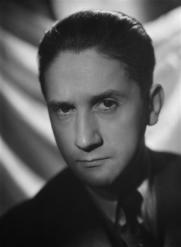Roger Desormiere
Roger Desormiere was born on 13 September 1898 in Vichy (France). His parents were hairdressers, and there is little known about the first musical experiences of Roger Desormiere. During his school days he performed as a flutist in the local band. In 1914 Roger Desormiere moved to Paris and studied at the conservatory under Philippe Gaubert (flute) and Xavier Leroux (composition), at the Schola Cantorum under Vincent d'Indy (conducting) and privately with Charles Koechlin (composition).
It seems that Roger Desormiere first focused on composing music, because in 1922 he received the Prix Blumenthal in the category "music" for his compositions. In 1923 he co-founded the "Ecole d'Arcueil“, a group of four composers - Henri Sauguet, Maxime Jacob, Henri Cliquet-Pleyel and Roger Desormiere - with Erik Satie as a mentor. The group organised concerts with the music of their members to promote the compositions. The first concert of the Ecole d'Arcueil took place in October 1923 and Roger Desormiere conducted the orchestra at the Theatre de Champs-Elysees. It must have been at that time that the career of Roger Desormiere switched from composing to conducting.
Today it is little known about the early compositions of Roger Desormiere, which works won him the Prix Blumenthal. In most cases no work catalogue is presented in biographies of him because after the few years as a composer Roger Desormiere made an eminent career as a conductor.
In 1924 Roger Desormiere conducted the Ballets Suedois of Rolf de Mare and since 1925 the Ballets Russes of Diaghilev. In the following years especially the concert tours with the Ballets Russes took Roger Desormiere all around Europe and earned him much success and reputation as a conductor of contemporary music.
Beside his support of contemporary music Roger Desormiere also championed early music. During his lifetime he edited and revived compositions by Couperin, Rameau, Lully or Delalande. Already in 1930 Roger Desormiere was appointed artistic director of the "Societe de Musique d'Autrefois", a society focusing on the early music.
In 1932 Roger Desormiere became involved in music for films with the film studio Pathe-Nathan. He composed music for several films and also conducted the orchestra in over 20 other films.
His successful conducting career continued as well and Roger Desormiere became conductor of the Opera Comique between 1937 and 1944, of the Opera de Paris from 1944 to 1946 and finally of the French National Symphony Orchestra in 1947.
Nowadays Roger Desormiere is best remembered as the conductor of world premieres of many outstanding compositions of the 20th century. He conducted the premieres of the Turangalila-Symphony by Messiaen, the Symphony No.4 by Milhaud, the Symphony No.1 by Dutilleux, the Symphony No.3 by Malipiero or the second version of Le soleil des eaux by Boulez. He also conducted the first complete recording of Claude Debussy's opera Pelleas et Melisande in 1941.
In 1952 Roger Desormiere suffered a massive paralytic stroke while driving through Rome. This ended his artistic career at a moment's notice. Being aphasic after the stroke Roger Desormiere completely withdrew from all public and musical activities for the rest of his life. He finally died on 25 October 1963 in Paris (France).
The work catalogue of Roger Desormiere is small. He composed Duos pour flute, "Six danseries du XVIe siecle" for wind quintet, the song "Lumiere dans la nuit" on words by Francis Jammes, a few more songs, some film music and the orchestration of Satie's "Genevieve de Brabant".
3 pieces for orchestra
In my possession is the autograph manuscript of the composition "3 pieces pour orchestre" by Roger Desormiere. The work was composed in 1917, is scored for large orchestra and consists of the three movements 1. Montlucon, 2. Bourg-Lastic and 3. Versailles. Roger Desormiere was based at barracks in each of these towns during the World War I. For that reason the work is sometimes called "Mes casernes" (My barracks) and also one of the manuscripts bears that title. Another manuscript has the title "Musique militaire". But the continous name on all documents is "3 pieces pour orchestre".
The first movement "Montlucon" was on the shortlist of the Prix Verley in 1921. The Prix Verley was given to unpublished orchestral compositions in 1921 and 1922 and was donated by perfume industrialist Albert Verley. A small selection of the entered compositions were performed and the audience could decide which work was the best. For that reason "Montlucon" by Roger Desormiere was performed by the Concerts Golschmann on 17 February 1921 with the other three nominees by Arthur Honegger (Pastorale d'ete), Jean Cras (Ames d'enfants) and Andree Vaurabourg (Prelude). The newspaper announcements for this concert didn't mark the performance of "Montlucon" as the premiere (which they did for the Honegger work) and so a previous performance must have been taken place. But I have no information when and where this has happened. And for the Prix Verley: In the end Arthur Honegger and his Pastorale d'ete took the award.
In my possession are full score, piano reduction and all orchestral parts for all three movements, so it seems likely that also the two other movements received premiere performances. But I could not find any information about that.
For information purposes I present here the full score of the "3 pieces for orchestra" by Roger Desormiere:
